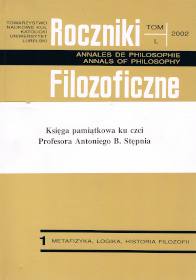On predicate logic. Logical-philosophical analysis
Abstract
This paper presents the central part of the contemporary logic: the predicate logic. By determining the types of primitive elements that make up the parts of the judgement the author tries to describe the structure (logical form) of atomic judgement that we meet in predicate logic. The main task is to find out the logical and philosophical fundaments of the asymmetry of the subject and predicate in the logic of quantification. This main aim was motivated by the assumption that if the current logic (predicate logic) has the significance, which we are inclined to attach to it, then it must reflect fundamental features of our thought about the world. Therefore the author of the paper analyses the logical and philosophical reasons that can be put forward for preferring the modern predicate logic to the traditional theory of general inferences which occur in syllogistic. To show the difference between the logical form of the basic proposition established in traditional logic and the logical form of atomic proposition in post-fregean logic some specific points were taken into consideration: the problem of reference; negation; existential import and others. At the end it was explicated that the crucial move – which was revealed in predicate logic – lay in extending the idea of function−argument analysis from mathematics to logic.
Copyright (c) 2002 Roczniki Filozoficzne

This work is licensed under a Creative Commons Attribution-NonCommercial-NoDerivatives 4.0 International License.





